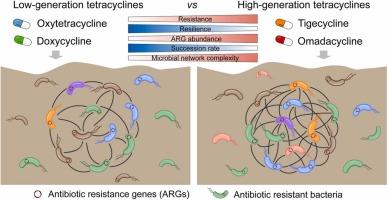当前位置:
X-MOL 学术
›
J. Hazard. Mater.
›
论文详情
Our official English website, www.x-mol.net, welcomes your
feedback! (Note: you will need to create a separate account there.)
High-generation tetracyclines shifted microbial community composition and induced the emergence of antibiotic resistant bacteria in soil
Journal of Hazardous Materials ( IF 12.2 ) Pub Date : 2024-09-05 , DOI: 10.1016/j.jhazmat.2024.135757 Ying Li 1 , Xiaoying Liu 1 , Jie Wang 1 , Si Li 2
Journal of Hazardous Materials ( IF 12.2 ) Pub Date : 2024-09-05 , DOI: 10.1016/j.jhazmat.2024.135757 Ying Li 1 , Xiaoying Liu 1 , Jie Wang 1 , Si Li 2
Affiliation

|
Tetracyclines (TCs) have been widely detected in agricultural soil due to their widespread use in animal husbandry. The impact of low-generation TCs, i.e., the first- and second- generations, on soil ecosystem has attracted widespread attention. However, the dynamic response of soil microbial community to high-generation TCs, i.e., the third- and fourth- generations, remains largely unknown. Herein, we characterized the variations in the composition, diversity and succession of microbial community and the proliferation of antibiotic resistance genes (ARGs) under the stress of four generations of TCs in brown soil and red soil. The results demonstrated that the exposure of low- and high- generation TCs consistently decreased the alpha diversity and stimulated the succession rate of microbial community in soil. High-generation TCs strongly shifted microbial community composition by reducing community resilience. The complexity of microbial networks and cross-module associations were strengthened to cope with the stress of high-generation TCs in soil. The abundance of ARGs was exacerbated by 1.75 times in response to the fourth-generation TCs compared to control in brown soil. The potential bacterial hosts of ARGs were more diverse in brown soil exposed to high-generation TCs, but the dominant hosts were not changed. These results highlight the potential ecological risk of the newly developed antibiotics, which is helpful for a comprehensive risk assessment of emerging contaminants.
中文翻译:

高代四环素改变了微生物群落组成并诱导了土壤中抗生素耐药细菌的出现
由于四环素 (TCs) 在畜牧业中的广泛使用,它们在农业土壤中被广泛检测到。低代 TCs(即第一代和第二代)对土壤生态系统的影响引起了广泛关注。然而,土壤微生物群落对高代 TCs(即第三代和第四代)的动态响应在很大程度上仍然未知。在此,我们表征了棕壤和红壤中四代 TCs 胁迫下微生物群落组成、多样性和演替的变化以及抗生素抗性基因 (ARGs) 的增殖。结果表明,低代和高代 TCs 的暴露持续降低了土壤中 α 多样性并刺激了微生物群落的演替速度。高代 TC 通过降低群落恢复力强烈改变了微生物群落组成。微生物网络的复杂性和跨模块关联得到加强,以应对土壤中高世代 TCs 的胁迫。与棕土中的对照相比,第四代 TCs 的 ARGs 丰度增加了 1.75 倍。ARGs 的潜在细菌宿主在暴露于高代 TCs 的棕色土壤中更加多样化,但优势宿主没有改变。这些结果突出了新开发的抗生素的潜在生态风险,这有助于对新出现的污染物进行全面的风险评估。
更新日期:2024-09-05
中文翻译:

高代四环素改变了微生物群落组成并诱导了土壤中抗生素耐药细菌的出现
由于四环素 (TCs) 在畜牧业中的广泛使用,它们在农业土壤中被广泛检测到。低代 TCs(即第一代和第二代)对土壤生态系统的影响引起了广泛关注。然而,土壤微生物群落对高代 TCs(即第三代和第四代)的动态响应在很大程度上仍然未知。在此,我们表征了棕壤和红壤中四代 TCs 胁迫下微生物群落组成、多样性和演替的变化以及抗生素抗性基因 (ARGs) 的增殖。结果表明,低代和高代 TCs 的暴露持续降低了土壤中 α 多样性并刺激了微生物群落的演替速度。高代 TC 通过降低群落恢复力强烈改变了微生物群落组成。微生物网络的复杂性和跨模块关联得到加强,以应对土壤中高世代 TCs 的胁迫。与棕土中的对照相比,第四代 TCs 的 ARGs 丰度增加了 1.75 倍。ARGs 的潜在细菌宿主在暴露于高代 TCs 的棕色土壤中更加多样化,但优势宿主没有改变。这些结果突出了新开发的抗生素的潜在生态风险,这有助于对新出现的污染物进行全面的风险评估。































 京公网安备 11010802027423号
京公网安备 11010802027423号